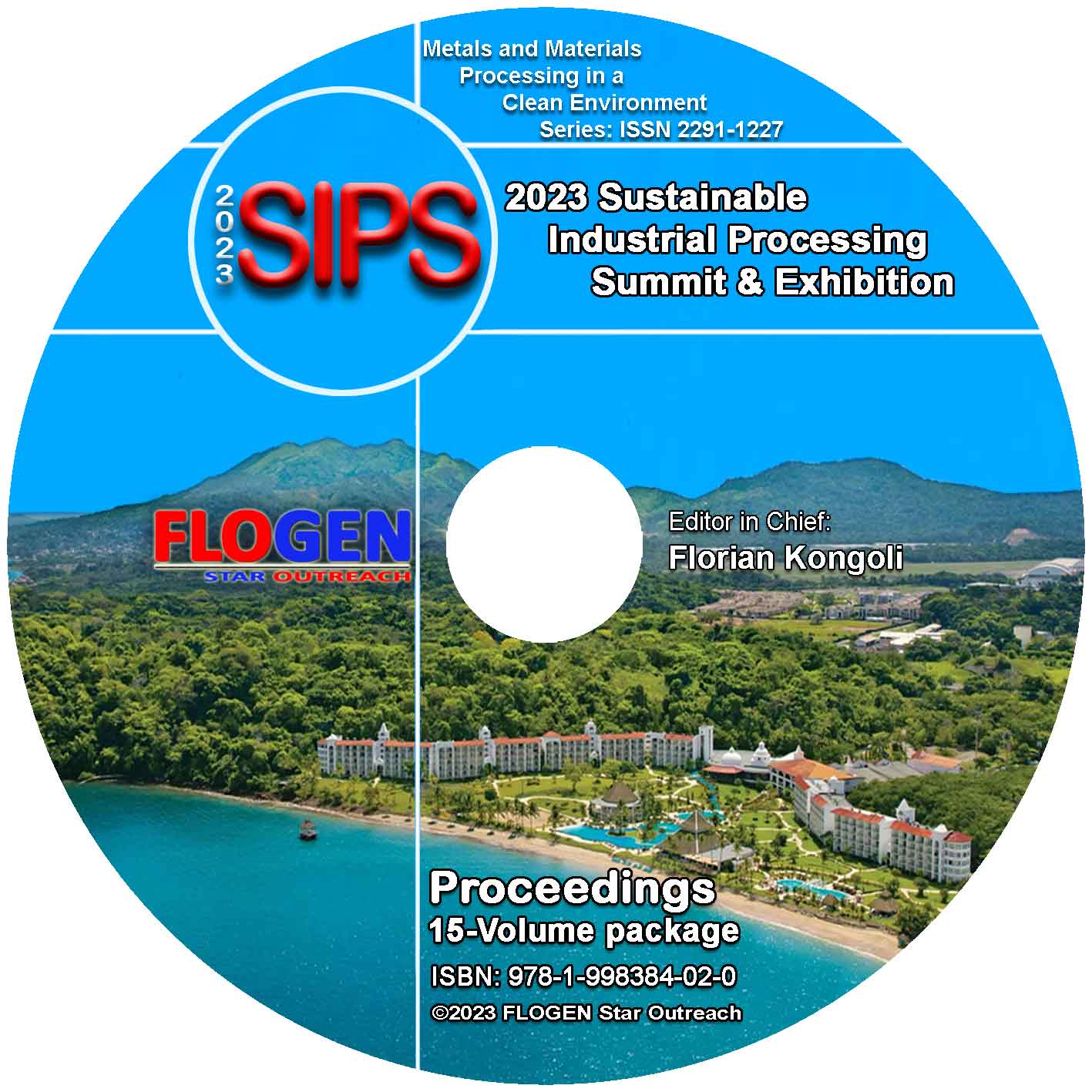2023-Sustainable Industrial Processing Summit
SIPS2023 Volume 11. Intl. Symp on Technological Innovations in Medicine
| Editors: | F. Kongoli, F. Murad, T. Yoshikawa, J.R. Ribas, D. Joseph, N. Tran, S. Hirano |
| Publisher: | Flogen Star OUTREACH |
| Publication Year: | 2023 |
| Pages: | 126 pages |
| ISBN: | 978-1-989820-92-6 (CD) |
| ISSN: | 2291-1227 (Metals and Materials Processing in a Clean Environment Series) |

CD shopping page
CANCER RESEARCH IN MICROGRAVITY: EXPLORING NOVEL FRONTIERS FOR PERSONALISED MEDICINE
Detina Zalli1;1UNIVERSITY OF CAMBRIDGE, CAMBRIDGE, UK, Cambridge, United Kingdom;
Type of Paper: Keynote
Id Paper: 281
Topic: 65
Abstract:
Cancer remains a complex and devastating disease, posing significant challenges to global healthcare. To address this pressing issue, pioneering research and innovative therapeutic approaches are essential. A novel frontier in cancer research lies in the investigation of microgravity (µg) conditions, such as those experienced during space travel, as a potential catalyst for advancing cancer research and personalized medicine. We will explore the promising intersection of cancer, microgravity (µg) conditions experienced during space travel, and personalized medicine as a novel frontier in cancer research highlighting the collective potential to revolutionize cancer treatment and therapy development.
Importantly, the limitations of the standard one-size-fits-all cancer treatment have led to a growing emphasis on personalized medicine. Tailoring treatments to individual patients based on their unique genetic makeup, environment, and lifestyle has been shown to enhance treatment efficacy while minimizing adverse effects. In this context, microgravity emerges as an intriguing avenue for exploration, offering new insights into cancer biology and therapeutic interventions.
We will focus on the profound impact of microgravity on cellular behaviour and molecular processes in cancer cells. Investigating real (r-) and simulated (s-) µg environments provides a research platform to identify novel pathways and potential targets for cancer treatment.Â
Additionally, µg environments facilitate the formation of three-dimensional (3D) tumour models, such as multicellular spheroids and organoids, which accurately mimic the in vivo tumour microenvironment. These 3D models offer invaluable tools for preclinical drug screening and personalized cancer therapy development.
The confluence of cancer, microgravity, and personalized medicine presents a transformative opportunity to accelerate cancer research and therapeutic development. By harnessing the unique conditions of µg to deepen our understanding of cancer biology and tailoring treatments to individual patients, this novel approach has the potential to pave the way for a new era in cancer care. The integration of personalized medicine with µg-based cancer research holds promise for optimized treatment outcomes and advancing cancer therapy, ultimately bringing us closer to overcoming this formidable disease.
Keywords:
Space; microgravity; cancer; cancer research; personalized medicine; therapy development; cellular behaviour; molecular processes; tumour models; cancer stem cells; treatment efficacy; preclinical drug screening; therapeutic interventionsReferences:
[1] Hanahan D, Weinberg RA. Hallmarks of cancer: the next generation. Cell. 2011 Mar 4;144(5):646-74. doi: 10.1016/j.cell.2011.02.013[2] Ries LAG, Young JL, Keel GE, et al. SEER Survival Monograph: Cancer Survival Among Adults: US SEER Program, 1988-2001, Patient and Tumor Characteristics. Bethesda, MD: National Cancer Institute, SEER Program; 2007.
[3] Saxena S, Thompson JP, Colgate EC, et al. Cancer and spaceflight: molecular mechanisms and future therapeutic targets. Semin Cancer Biol. 2021 Apr;70:272-281. doi: 10.1016/j.semcancer.2021.02.005.
[4] Takahashi A, Kaji K, Sasaki Y, et al. Simulated microgravity facilitates cell migration and inhibits cell proliferation via suppressing FAK activity regulated by ERK signaling pathway. Sci Rep. 2017 Aug 1;7(1):6802. doi: 10.1038/s41598-017-07232-1
[5] Wang R, Xu H, Peng Z, et al. 3D cell culture under microgravity condition maintains malignant properties of cancer cells with respect to gene expression and drug resistance. Cell Prolif. 2019 Jan;52(1):e12512. doi: 10.1111/cpr.12512
[6] Xiao H, Sun J, Li Z, et al. Microgravity potentiates stem cell proliferation while sustaining the capability of differentiation. Stem Cells Dev. 2015 Oct 15;24(20):2405-15. doi: 10.1089/scd.2014.0512.
[7] Zhang W, Pan Y, Li F, et al. Novel insights into therapy of cancer: implication of 3D cell culture. Front Pharmacol. 2020 Feb 25;10:1666. doi: 10.3389/fphar.2019.01666
[8] Zhu M, Liang C, Duan X, et al. The Effect of Real Microgravity on Cancer Biology: A Systematic Review. Front Oncol. 2020 Sep 4;10:1343. doi: 10.3389/fonc.2020.01343.
[9] Zong C, Zhang J, Huang Y, et al. Zero gravity promotes the invasion of thyroid cancer cells by increasing exosome secretion. Cell Biol Int. 2019 Mar;43(3):316-325. doi: 10.1002/cbin.11092.